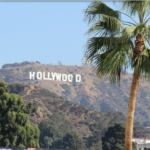Not only is California an ideal place for filmmakers due to the temperate weather conditions and beautiful scenery, in the early 20th century it also provided a safe haven from patent owners like Thomas Edison. In 1908, Edison helped form the Motion Picture Patents Company (MPPC) which held 16 major film patents. Representing a virtual monopoly on the movie industry, these patents covered nearly everything including projectors, cameras, and film stock. Further, the MPPC vigorously protected its patents by suing any pirates who screened or produced films without its permission and without paying for a license to use the patented equipment. In response to this negative environment, independent filmmakers including Carl Laemmle of Universal Pictures and Adolph Zukor of Paramount Pictures migrated to Hollywood, California ushering in a new era of American film. Judges in California were known for being unfriendly to patent owners and enforcement across the country otherwise proved burdensome. By 1915, Laemmle completed construction of his movie metropolis, Universal City, which is now home to the largest film production facility in the world and a theme park.
March 6, 2018

